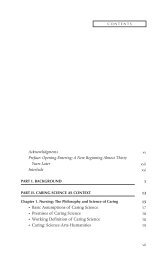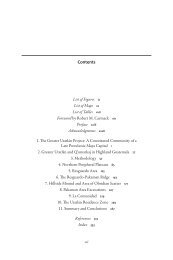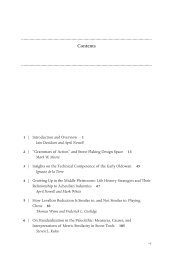free download - University Press of Colorado
free download - University Press of Colorado
free download - University Press of Colorado
You also want an ePaper? Increase the reach of your titles
YUMPU automatically turns print PDFs into web optimized ePapers that Google loves.
Tate Paulette<br />
The second point regarding resilience is that an analysis focused on systemic<br />
resilience may inadvertently overlook the existence and the effects <strong>of</strong><br />
institutionalized inequality and exploitation. Mesopotamian specialists are<br />
<strong>of</strong>ten ambivalent in their assessments (positive versus negative) <strong>of</strong> the role <strong>of</strong><br />
institutional dependency in Mesopotamia, and this ambivalence is particularly<br />
noticeable in discussions <strong>of</strong> resilience. Although Adams’s discussion <strong>of</strong><br />
the concept is regularly cited, the term resilience is <strong>of</strong>ten used in a looser, less<br />
explicit sense that actually merges the notions <strong>of</strong> stability and resilience rather<br />
than contrasting them, as Adams does. Many scholars tend to assume that the<br />
Mesopotamian institutions, by virtue <strong>of</strong> their size and wealth, were intrinsically<br />
better equipped to weather environmental or economic crises than were<br />
individual households (e.g., Postgate 1992: 299; Stein 2004: 77; Stone 2007:<br />
224; Westenholz 2002: 26). If true, this assumption (<strong>of</strong>ten presented without<br />
supporting evidence) would seem to contradict Adams’s argument that the<br />
maximizing strategies favored by the central institutions were unsustainable<br />
and produced significant instability.<br />
Even if it is eventually shown that the institutions actually contributed to<br />
system-level resiliency, this in itself says little about the effects <strong>of</strong> their practices<br />
on the people <strong>of</strong> Mesopotamia. In the highly stratified societies <strong>of</strong> Bronze<br />
Age Mesopotamia, the impacts <strong>of</strong> environmental hazards would not have been<br />
equally distributed across the social and economic spectrum. Resilience at the<br />
system or the institutional level might mask significant disruption and suffering<br />
for some segments <strong>of</strong> the population.<br />
Institutional Power, Resilience, and Collapse<br />
Exactly how successful were efforts by the palaces and temples to prevent and<br />
mitigate environmental hazards in Bronze Age Mesopotamia To what extent<br />
did institutional efforts to maximize and intensify production increase the likelihood<br />
<strong>of</strong> systemic failure or the vulnerability <strong>of</strong> specific segments <strong>of</strong> society<br />
First, it is important to recall that the institutional landscape was neither static<br />
nor spatially homogeneous. The local balance <strong>of</strong> power between palace and<br />
temple was under continual negotiation, and regional power blocs grew and<br />
dissolved with relative frequency. At the same time, the forms and methods <strong>of</strong><br />
institutional management were far from uniform; administrative reforms and<br />
large-scale restructurings were regularly instituted by newly ascendant regimes.<br />
Generalizations about the scope, effects, and effectiveness <strong>of</strong> institutional control<br />
in Mesopotamia are seldom possible.<br />
The study <strong>of</strong> collapse has, however, generated a series <strong>of</strong> vigorous debates<br />
over the changing relationship between institutional power and resilience in<br />
Mesopotamia (e.g., Y<strong>of</strong>fee 1988). The paragraphs that follow provide a brief<br />
look at the three best-known episodes <strong>of</strong> collapse. The explanations <strong>of</strong>fered for<br />
182





